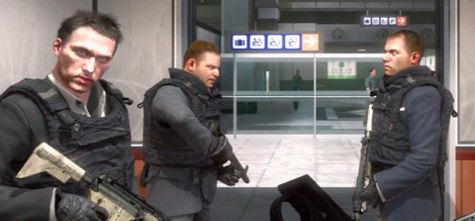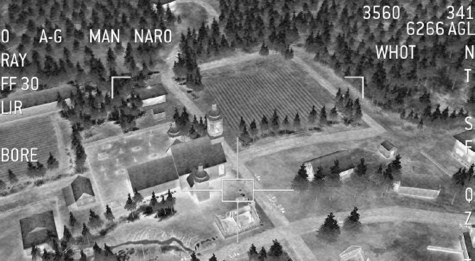
This has been bugging me for a while, so it’s time to solve it with a game-design exercise. It contains lots of spoilers for Call of Duty: Modern Warfare 2, but I’m pretty sure anyone who cares is already spoiled, so don’t read on if you’ll be offended.
No Russian is that level from Call of Duty: Modern Warfare 2. Even if you don’t play games, you might have heard about it on the news: it’s a sequence in which the player, as a US soldier undercover with Russian terrorists, takes part in a terrorist massacre. From the outset, is clearly intended to be shocking, and has certainly generated the expected reaction in the popular media.
As a player, I did find it unsettling and unpleasant – enough so that I don’t really want to play through it ever again. As a piece of gameplay, though – indeed, as a piece of a game – it falls completely flat. It’s cheap manipulation, full of holes not only in logic but also in simple interaction, and most of the commentary from the wider games community has had some degree of criticism of it. Kieron Gillen’s post on Rock, Paper, Shotgun is a pretty comprehensive summary of the issues with it. For the most part, I agree with Kieron: tonally, it’s absurb compared to the previous and following levels; his point about player choice confusing the storytelling of the level, rather than enabling it, is also a reasonable one. (I’m not with him on the realism of the airport shoot-out; I think it falls precisely into the authenticity-of-universe that the rest of the game does, namely, mildly bonkers, and I think his digresson on it distracts from his solid, main point – much as this digression does mine).
It’s definitely broken as storytelling. But how would you fix it?
There are some strict criteria to my imagined exercise of “fixing it”: you can’t remove the level; you can’t alter the narrative, however preposterous, in any significant way; the level must play out between “Cliffhanger” and “Takedown“; the state of the world at the beginning and the end of the level must be the same as in the released version of Modern Warfare 2. You’re not allowed to change the style or nature of the game – it can’t become an open-world game all of a sudden; it has to stay true to the linear, semi-corridor-shooter design. All you are allowed to do is fix this one level through game design. (So: this doesn’t solve the problems of the plot, but it might make the level more effective at what it chooses to do).
I have a rough idea, and it involves making two – only two – changes.
1) A new opening
I think to give the player choice in shooting the civilians muddies the intent of the level. Whatever you may think of that, the level is designed to be unsettling, unpleasant, and, narratively, that massacre has to occur. To be honest to Infinity Ward’s intent for this level, there shouldn’t be flexibility in the player’s actions. At least, to begin with.
And therein lies a problem: we can’t wrest control from the player in a first-person view – that’s just dishonest to the perspective. We can’t do third-person cutscenes; that’s not true to the style of the game. We can’t just skip the massacre; that’s not true to the intent of the writing, to the effect Infinity Ward want to have. We have to include it, in a perspective honest to the game, and remove the chance it might not play out.
What we need is a new perspective, without a third-person camera, and to do that, we use the traditional Call of Duty solution: we introduce Yet Another New Player Character. In this case, the Russian CCTV operator.
The level begins with General Shepherd’s voiceover. Instead of smash-cutting to the perspective of Private Allen… we cut to the perspective of a CCTV camera. A subtitle tells us that we’re playing as a CCTV operator at Moscow airport. We’re not sure what to make of Shepherd’s voice-over.

Infinity Ward have a great “fuzzy black-and-white camera” renderer – you’ve seen it in the AC130 mission of the previous game – and it’s ideally suited to rendering the grainy black and white of CCTV. The detached slaughter of the AC130 mission in the previous game is shocking precisely in its detachment, and I want to recreate that in my imagined No Russian.
So: you have two controls as the CCTV operator. You have minor camera control over the camera, moving it left/right/up/down; you also have a button to toggle your viewpoint to other cameras in the airport. That’s it. You have no agency: you are just an observer.
For a minute, it’s a regular day at Moscow airport. And then: four men step out of a lift and all hell breaks loose. The gunfire is distant – there’s no sound on these cameras, just the spill from down the corridor – and instead, the main soundtrack is the panic in the CCTV room, frantic phone calls, chatter and static on the walkie-talkies. Your boss keeps asking you to try and get a clear shot of faces. Nothing can be done, other than follow, as the four men shoot innocent civilians.
We give the player no degree of agency – just a crude tool to spectate. And we remove choice: it’s clear that all four men are shooting. All of them.
And then, just as they are fading from view of our final camera, into the fire-exit that will take them outside…
…the camera perspective does the familiar Infinity Ward smash-zoom into the head of the back man. And, as the subtitle comes on screen, suddenly, the player realises – perhaps, with horror – exactly what Shepherd was talking about in the interstitial before the level: Allen is undercover as one of the terrorists. We’ve just seen what he’s done – and now we have to not only live with it, but control him.
The level now continues as in the released game, with the rolling shoot-out with the Russian security forces. Only now, you know what your character’s just done; the game reinforces the roles of both “the character” and “the player”, and forces the player to question the gap between both of them.
There’s one other change I’d make.
2) Removing the sacrosanct narrative bullet
The other shocking element to the level in the original game is that, as it ends, Makarov shoots and kills the player character, revealing that he knew the player to be an American spy all along.
Infinity Ward pulled off the unavoidable death of a player character excellently in Call of Duty 4 – the death of Paul Jackson in the nuclear blast is shocking, if only because it seems, so briefly, as if you might survive; it jars because it’s a rule-breaking removal agency; it awes in its presentation.

In Modern Warfare 2, though, that trope is flogged to an inch of its life.. Three player characters, at my count, die in Modern Warfare 2 (Roach, Allen, and the poor un-named astronaut who exists for all of ten seconds). It’s beginning to lose its impact; it’s just another pre-scripted event within a level, that we’ve all seen before. (It was the astronaut that made me really angry and convinced that this had become a cheap trick; he doesn’t even get a name before he dies!)
I wanted to introduce some unpredictability into the level, something that would make the player “sit up” in the same way the nuclear bomb did in COD4. It would have to be something unlike anything else in the rest of the game. So my other change to No Russian is simple: when the player is killed, the level ends immediately. There are no restarts for this level. The final narration plays out, explaining that one of the terrorists was an American, and the (deranged) narrative arc of the game continues as before.
I have a dislike for narrative bullets. You know: the single bullet that proves fatal simply because it’s required to do so for narrative reasons. Why does Makarov’s one bullet count, when the hundreds I’ve absorbed in the level already are shrugged off?
Makarov’s bullet doesn’t need to be special; regardless of who kills Private Allen, someone will discover he’s an American when they find his corpse. So: if the player makes it to the end of the level, they’ll be killed by Makarov – but if they’re killed earlier, by the security guards, or the SWAT teams – well, it makes sense to end the level there; from a narrative perspective, their cover is blown as soon as they die. The level is meant to be jarring, a shocking change from the norm of the game; why give someone the chance to replay a massacre? Giving them a single attempt makes the other-ness of the level immediately obvious. It also removes the reliance on the narrative bullet at the end, and as a result, the internal rules of the level to my mind feel “fairer”.
And that’s it.
It doesn’t make the game less preposterous; it doesn’t remove all of the heavy-handedness of a sequence clearly designed to shock. But these two fixes, to my mind, do treat the player more fairly, and emphasise the sanctity of the narrative in this linear, story-driven game. At the same time, the player now has more consistent rules for their death, ensuring they can’t corrupt the narrative of the story through choice. The level also now embraces that lack of freedom of choice, and uses it to strengthen the shock and disquiet of the level.
I still wouldn’t be happy with this level – the issues around its change in tone, how it sits in the plot, how it breaks the pacing still stand – but I think that this remains an interesting exercise: fixing a game level that is, at best, problematic, and at worst, unfixable.